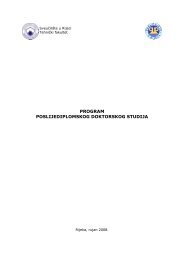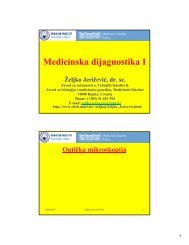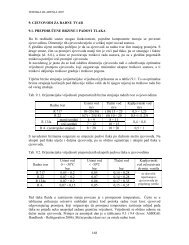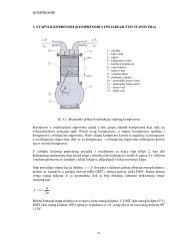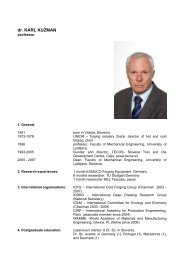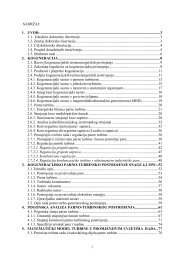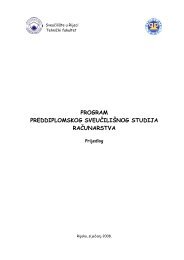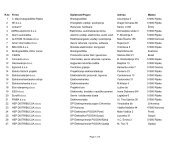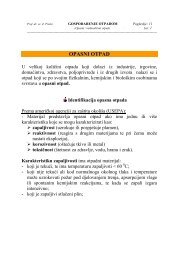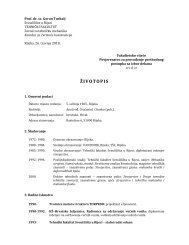universityâenterprise cooperation
universityâenterprise cooperation
universityâenterprise cooperation
You also want an ePaper? Increase the reach of your titles
YUMPU automatically turns print PDFs into web optimized ePapers that Google loves.
38<br />
S&T institutions and other key players<br />
important for S&T policy making, and to<br />
present relevant S&T policies and strategies.<br />
Besides mentioned platform there are<br />
other initiatives and programmes which<br />
are aimed to strengthen scientific potential<br />
of the WBC region, to address strategic<br />
social and economic needs and to facilitate<br />
integration of this region into ERA. The<br />
Southeast-European ERA-NET (SEE-ERA.<br />
NET) has been established in order to promote<br />
R&D <strong>cooperation</strong> among consortium members<br />
and to contribute to the WBAP implementation. A<br />
number of specific objectives, recommendations<br />
and implementation scenario have been<br />
proposed by SEE-ERA.NET consortium,<br />
described in White paper [86]. Consortium<br />
launched in 2006 a “Regional Programme<br />
for Cooperation with South-East Europe”<br />
(ReP-SEE), and in 2007 proposed Joint<br />
Action Plan, which provide unique<br />
instruments and measurement for enhanced<br />
S&T <strong>cooperation</strong> with the WBC region [44].<br />
4.1.3 Innovation side<br />
Innovation systems of the WBC are very weak<br />
and fragmented. Weak innovation demand at<br />
enterprise level and weak innovation support<br />
system are the biggest impediment for the<br />
greater contribution of research to growth<br />
and social development. Supporting actions<br />
at national and regional levels are aimed at<br />
developing inter-firm clusters and networks,<br />
enhancing pan-European <strong>cooperation</strong> among<br />
SMEs. On their road to Europe, the WBCs have<br />
made considerable progress in redressing<br />
their entrepreneurial environment for SMEs.<br />
In most of the WBC, the progress is made by<br />
enabling cheaper and faster start-ups. The<br />
WBC participate in the Chapter for Small<br />
Enterprises [66], which calls on subscribing<br />
parties to undertake economic reforms<br />
in ten policy areas. SMEs’ technological<br />
capacity, essential for competitiveness and<br />
innovation, is slowly being strengthened<br />
in the WBC region. A flexible, knowledgebased<br />
economy requires enhanced levels of<br />
innovation which would clearly be improved<br />
through better and more effective links<br />
between research and development centres<br />
at universities and SMEs. Despite of the<br />
fact that the proportion of population with<br />
tertiary education is comparable with EU25,<br />
there are major weaknesses of WBC relative<br />
to EU, regarding to public R&D expenditure,<br />
number of Science&Engineering graduates,<br />
business R&D investments, participation in<br />
Life-long learning, number of employment<br />
in high-tech manufacturing and services.<br />
The lack of effective links between<br />
knowledge-producers and knowledge-users<br />
constitutes a significant weakness in the<br />
regional innovation system.<br />
Thematic report “Innovation Infrastructures<br />
in the Western Balkan Countries” [38]<br />
deals with the situation of innovation<br />
infrastructures in the WBC countries and gives<br />
overview of established clusters, technology<br />
and innovation centers, technological and<br />
science parks, business-start-up centers/<br />
technology incubators and other related<br />
organizations. The general environment,<br />
important strategic documents and the main<br />
programmes and instruments for support<br />
have also been described.<br />
In addition, within mentioned ReP SEE<br />
programme, study on Innovation absorption<br />
capacity and transnational <strong>cooperation</strong><br />
needs in SEE, with particular focus on<br />
the WBC, has been undertaken by Euro<br />
consultants S.A [37] in 2007. This study<br />
presents policies and programmes supporting<br />
innovation (EU, regional, national), list of<br />
main innovation stakeholders in SEE and<br />
WBC, as well as innovation funding sources.<br />
Particular emphasis was put on the analysis of<br />
involvement of SMEs in the innovation process,<br />
their needs, opportunities and barriers.<br />
4.2 Current state and developed<br />
KT structures in the WBC region<br />
This section will briefly present the situation<br />
in the areas that make up the knowledge<br />
triangle – education, research and



